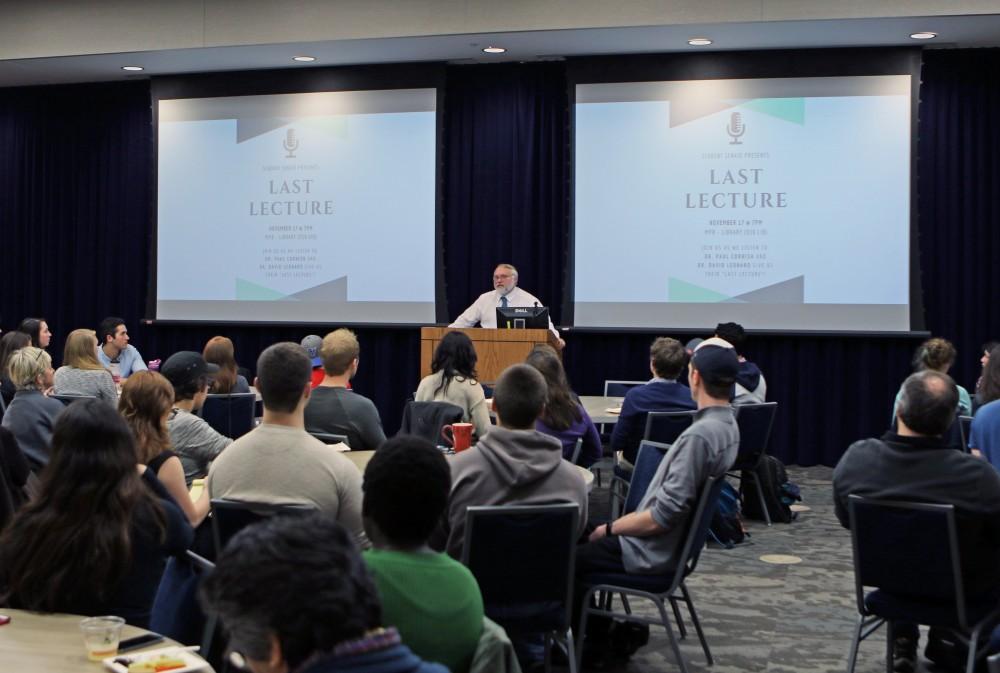GVSU professors deliver Last Lecture addresses

GVL / Emily Frye Dr. David Leonard Thursday Nov. 17, 2016
Nov 21, 2016
Grand Valley State University’s student senate continued its annual Last Lecture tradition Thursday, Nov. 17 by hosting two GVSU professors who drew upon their own experiences and backgrounds to inspire GVSU students to lead productive, fulfilling lives.
Paul Cornish, political science professor, and David Leonard, chemistry professor, delivered their metaphoric last lectures in the Multipurpose Room of the Mary Idema Pew Library to a group of students, colleagues and family.
Both Cornish and Leonard discussed the importance of personal relationships, although they lent different perspectives and focuses to their talks because of their respective backgrounds and areas of expertise.
Cornish said a health scare made him consider what he appreciates most in life.
“When you experience this kind of attack, I think that it’s likely to make anyone start to look at life in a new way,” he said. “For me, it caused an awareness of a need to be thankful. It may seem odd, (but) one of the things I have become most thankful about (is) servitude to other people.
“I am thankful being able to serve in the very small way I do the people who make up my community, which is so beautiful, not least because it’s made up of so many different kinds of people.”
Cornish said his lecture topic was in response to recent negative trends he’s seen in political discourse.
“I’ve been thinking for a long time about why our society at this point of history is experiencing such high levels of distrust in government, but also in each other,” he said. “I wonder if part of the problem with that is that as a culture we’ve become too used to focusing on what is negative. (We) don’t count our blessings. I think that might be part of what’s causing our trouble (in) our political discourse.”

While Cornish focused his lecture on thankfulness and servitude, Leonard described his experience studying proteins and applied the concept of an infinite physical world to the idea of infinite possibilities for individuals to impact the world around them.
“What’s amazing to me is when I look at (proteins), I’ve come to see that the world is much bigger than I would have ever imagined and that what we don’t know is much bigger,” Leonard said. “We’ll never know everything. To me, that means there’s infinite potential in the world, (and I) think the most important impact you have is going to be through people and how you treat them.”
Leonard argued an individual’s sphere of influence extends far beyond their immediate relationships, referencing personal experience and Frigyes Karinthy’s concept of the six degrees of separation to prove one impacted person can impact another, and so on. Ultimately, the “map” of an individual’s impact becomes a complex, wide-reaching web of influence.
“There’s tremendous potential in everybody, and the world is a big place,” Leonard said.
Both Cornish and Leonard expressed astonishment and gratitude at being nominated and selected as presenters for Last Lecture.
“I was amazed (and) very humbled,” Cornish said. “This is a kind of affirmation of my vocation. That’s very satisfying, but at the same time very humbling.”
Leonard expressed a similar sense of appreciation.
“I was surprised and humbled,” he said. “When I think of Last Lecture, (I) think of really brilliant, insightful people, and that’s not how I picture myself.”
Alexander Turnbull, the student senator who planned this year’s Last Lecture, said past speakers for this event had been primarily liberal arts and science professors who had not offered much variation in terms of themes. This year, he said, student senators wanted to choose professors from other areas of study who could contribute different perspectives and ideas, hence the selection of a political science professor and a chemistry professor.
The decision to have two speakers at this year’s Last Lecture was unusual, as well.
“Normally, it’s one professor who speaks,” said Malayna Hasmanis, student senate vice president for educational affairs. “But these two had so many nominations, (and) people said that they inspired them to do better in life as a whole. (I) think that’s very powerful they did that outside of the classroom.”

























